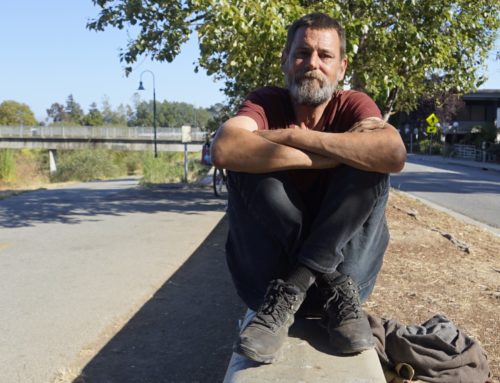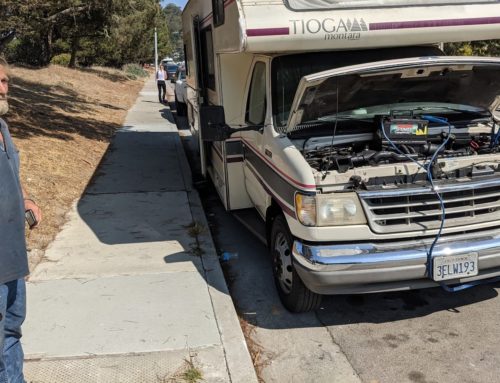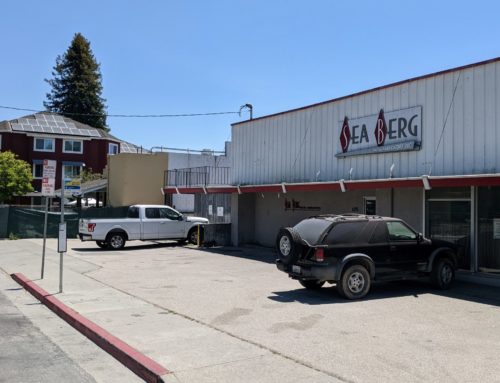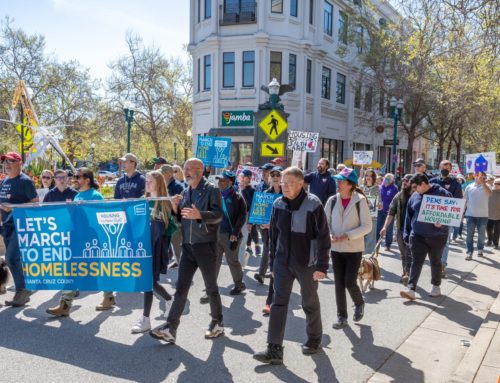In January, we interviewed more than 200 voters from Santa Cruz, Live Oak, Aptos, La Selva Beach, Corralitos, Soquel, the Summit, Capitola and the surrounding areas. Our goal: Listen to ordinary people’s priorities for the upcoming March 3 local election. We tried to find voices that you don’t normally hear in city council or board of supervisors meetings.
We share with you what we learned from our interviews and our online survey. Based on what we heard, we wrote a list of questions that we asked the candidates for Santa Cruz City Council and the Santa Cruz County Board of Supervisors.

Listen to the entire “Vote March 3” podcast series:
- Part 1: Voting in Santa Cruz County 101 (Jan. 8, 2020)
- Part 2: The People’s Agenda (Jan. 30, 2020)
- Part 3: The District 2 supervisor race (Feb. 3, 2020)
- Part 4: The District 1 supervisor race (Feb. 6, 2020)
- Part 5: Santa Cruz City Council recall, Drew Glover’s seat (Feb. 9, 2020)
- Part 6: Santa Cruz City Council recall, Chris Krohn’s seat (Feb. 10, 2020)
Editor’s note: Transcripts are usually only for members, but we’re making our “Vote March 3” transcripts available to everyone. We hope this series will encourage more people to get informed about the March 3 local elections.
TRANSCRIPT
KARA MEYBERG GUZMAN: This episode is sponsored by Santa Cruz Works, your connection to our area’s thriving tech and business community. With over 5,000 members, Santa Cruz Works gives you access. The largest monthly tech events. Solutions for your startups and businesses. Connections to the hottest jobs. And the latest news about local companies: their stories, and best practices. Subscribe free to the Santa Cruz Works weekly newsletter today. santacruzworks.org/podcast

[AMBI: SOUND OF PEOPLE TALKING]
KMG: Among the bungalows and motels of Santa Cruz’s Lower Ocean neighborhood is a white one-story building. It’s on East Cliff Drive, across from the San Lorenzo River. It kind of looks like a house. But it’s actually the headquarters of Nueva Vista Community Resources.
The program runs a homework club. They also help people apply for things like food stamps, housing and jobs.
It’s a chilly afternoon in January. Nueva Vista’s food pantry is open. Instead of a car in the garage, there are dozens of bags of potatoes, grapefruits, onions and apples. Families drop in to pick up their bags.
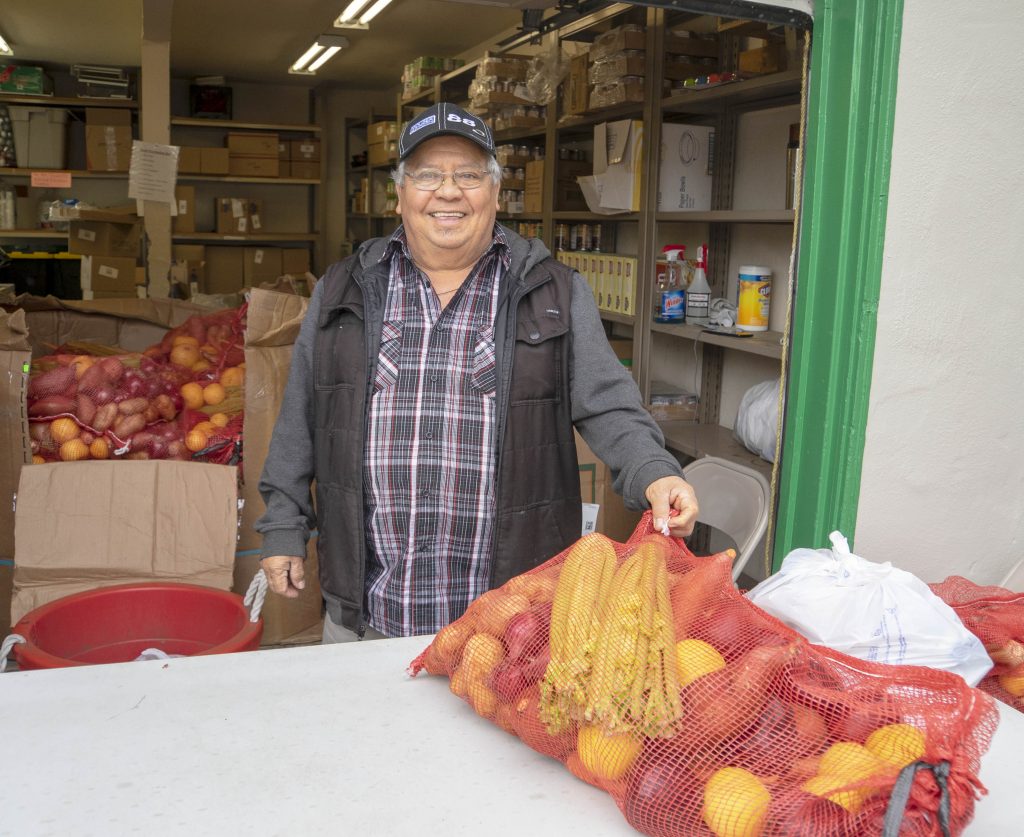
I’m here to listen to Beach Flats and Lower Ocean residents about their priorities for the March 3 Santa Cruz City Council elections.
NAYELI LOPEZ: The priority for everybody is safety and homeless. Needles.
KMG: That’s Nayeli Lopez. She’s 36. She lives in Lower Ocean with her husband and two teenagers. She cleans homes for a living.
NAYELI LOPEZ: You know I got two kids, and they were so happy to surf. they quit, because the beach is dirty, We went to the beach and we stepped on a needle, my husband.
And it’s a big concern. They cant use the park anymore, neither the beach. Or you know, be outdoors because all the needles, all the homeless, all the dirt. And we’re paying taxes to live in paradise.
Dirty paradise.
KMG: I’m Kara Meyberg Guzman
STEPHEN BAXTER: I’m Stephen Baxter
KMG: This is Santa Cruz Local.
Over 10 days in January, our team interviewed more than 200 people across Santa Cruz County. We wanted to hear their priorities for the upcoming election. We attended or hosted more than a dozen community events. We went to farmers markets, coffee shops, women’s groups and a neighborhood meeting.
SB: Our goal? Listen to ordinary people. The voices you normally don’t hear at a city council meeting or online. We used the interviews to create a list of questions for the local candidates in the March 3 election. You’ll hear their answers in our next few episodes.
We’re covering the District 1 and 2 supervisors races and the Santa Cruz City Council races. So, we’ve zeroed in on voters from Live Oak, Soquel, the Summit, Aptos, Corralitos, La Selva Beach and Santa Cruz.
We asked everyone we met: What do you want local candidates to talk about as they compete for your vote?
ESTHER AGUILERA: Oh my god, por que, madre mia, ya no podemos pagar la renta.
KMG: Esther Aguilera, another woman I met at Nueva Vista. She wants local government to do something about her rent. It’s just too much, she says. And she wants more housing development in her neighborhood.
Esther and her husband share a one-bedroom apartment in Lower Ocean. They live with their two adult children. Esther was a housekeeper until she was in a car accident. She can’t work anymore. Now she’s on Social Security. The family pays $2,200 in rent.
AGUILERA: Mi sueno es…
KMG: My interpreter is Oscar Rios, who runs a Spanish translation group.
AGUILERA: Que hay mejoria en todo, en vivienda, en mas trabajo…
OSCAR RIOS : [translating] My dream is to have more jobs, you know and everything. There would be more work, and also the housing issue. And a lot of things would get better here. The community would be better.
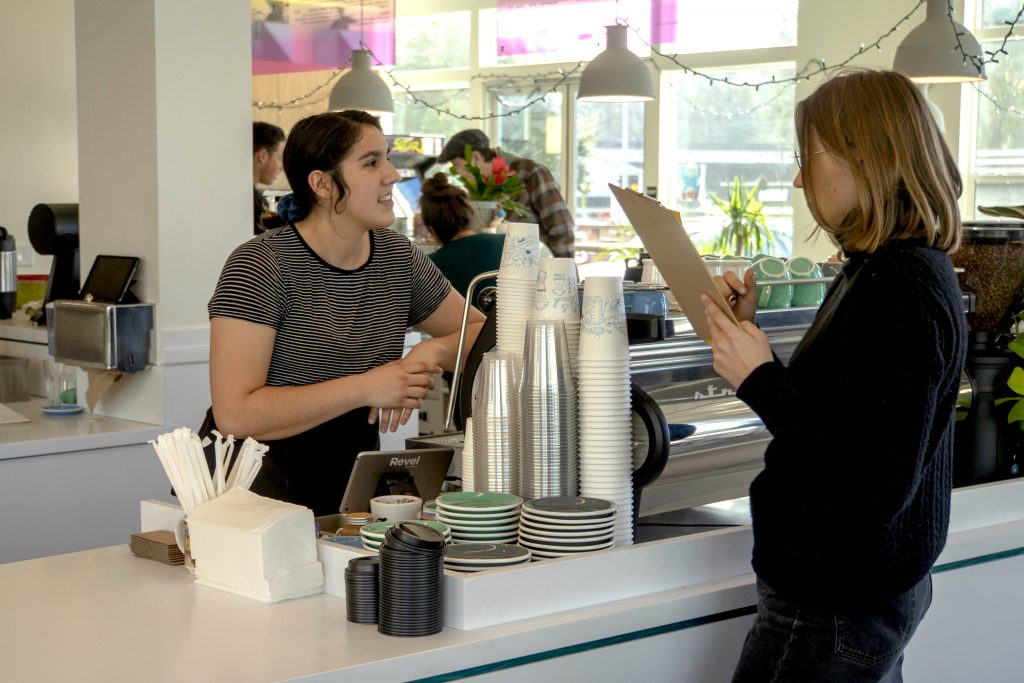
SB: Housing was the most common theme we heard from our interviews. We heard somewhat of a generational divide. Roughly speaking, younger voters were more urgent in their call for affordable housing development.
On a Sunday morning overlooking the ocean at Pleasure Point, we spoke to Jeremy McGirr. He’s a 25-year-old. He’s an arborist. And he lives in Live Oak.
JEREMY MCGIRR: With a lot of the jobs in the local area, it’s hard to afford to live here. And as a young professional, being able to ever attain affordable housing seems like it’s a looming goal. Like it’ll never be achievable, especially in this area, where you have to make hundreds of thousands to be able to afford a house.
Jobs would definitely help. I’d like more affordable housing though. It seems like everyone who maybe bought houses here, 30, 20-plus years ago is really who owns the real estate here.
SB: The top themes we heard were: housing, homelessness, the environment and jobs. For the city of Santa Cruz, discord on the city council was another top theme. For Aptos, Live Oak, Soquel and surrounding areas, traffic was also a top concern.
KMG: But beyond that, people talked about not feeling safe. Many were fed up with bike thefts and car break-ins.
SB: We also heard a desire for more diversity in Santa Cruz and in Santa Cruz County.
KMG: We heard from some of you why you care about plans for the downtown library. From others, we heard about the future you’d like to see for the county’s rail line.
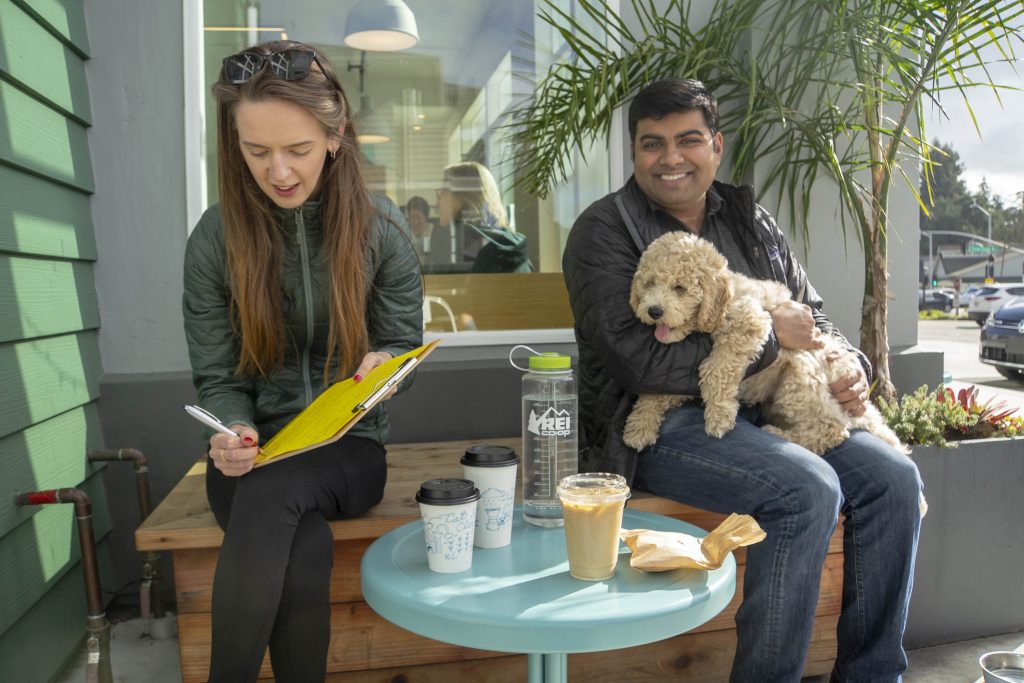
SB: Speaking of the future, here’s Tamar Mitnick. We heard from her at the Aptos Farmers Market at Cabrillo College.
TAMAR MITNICK: I care about that everyone has the health care that they need. And that everyone should be treated equally. And I dunno, what other political problems are there.
FAMILY MEMBER [OFF MIC]: You were passionate about the environment…
TAMAR: Oh yeah, global warming is a big problem right now.
SB: Tamar is 10 and lives in Aptos. She says she surfs and she cares about the environment.
TAMAR: Because you know, it’s my future. And this is the world that we’re going to grow up in. And the future that we’re going to live in for the rest of our lives. So I hope it’s a good one. it’s the only future we’ve got. And I hope it’s a good one.
SB: Of the 200-plus people that we interviewed, about a quarter said they wanted our local government to be a leader on environmental policy.
Here’s Aptos resident Cathy McDowell. We also met her at the Aptos Farmers Market.
CATHY MCDOWELL: I’m 67 years old, so whatever happens before I die, it’s nothing compared to what’s gonna happen to my 8-year-old grandson. I feel like we’re really screwing up. We’re not paying attention. We’re not doing what we need to do and the kids are going to suffer.
[BRIEF MUSICAL INTERLUDE]
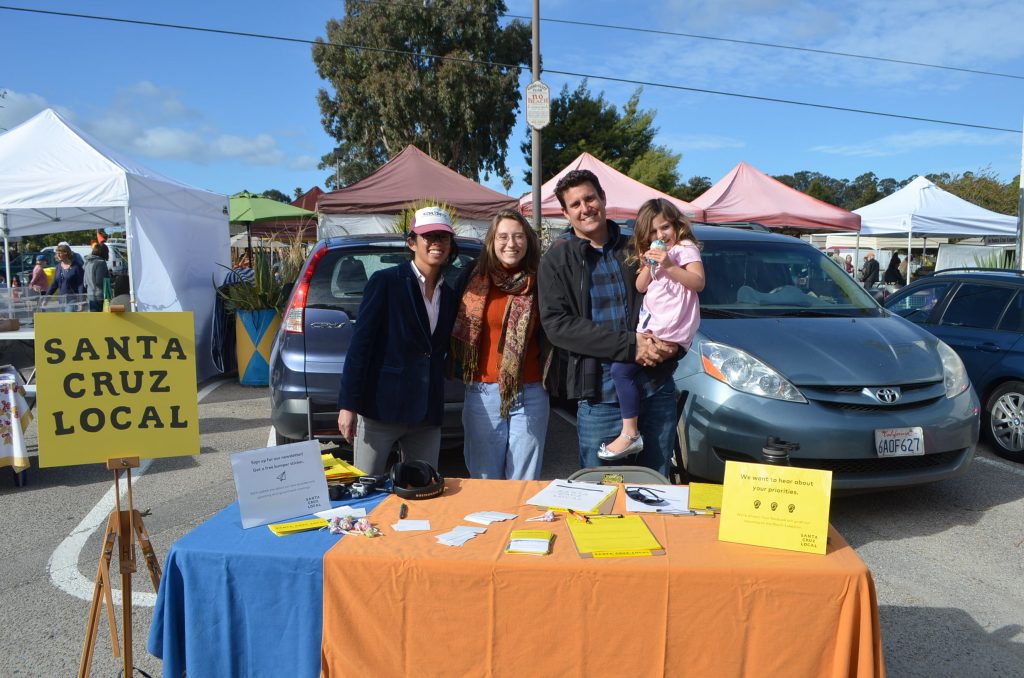
SB: Alright, we’re back in the studio. We’re here with our community engagement intern Natalya Dreszer. Natalya, you helped us compile these more than 200 interviews. What surprised you?
NATALYA DRESZER: I wasn’t particularly surprised by any of the individual themes, but the nuance that people went into was really intriguing.
So for example, with housing, generally speaking, many younger people were worried about whether or not they’d have a place to live here. They wanted more development, more housing.
And generally, many older people were worried that having more development and more housing could change the vibe of their neighborhoods that they’ve lived in for decades.
KMG: One of the memorable interviews I had actually was with my father-in-law, Ralph Meyberg. I interviewed him for about 15 minutes when we set up Open Newsroom Office Hours at the downtown farmers market. And we talked about sort of a generational gap on views towards housing.
He said he wished that people fresh to Santa Cruz would realize how much effort it took to preserve the environment, to build livable neighborhoods. He said, think about what the alternative would have been: San Jose sprawl, he said.
SB: Brave of you to speak of your in-laws in this context of the survey.
KMG: [LAUGHING] Yeah, I mean, it was it was really interesting to have, you know, like a heady discussion. Ralph was involved in the ’70s, ’80s and ’90s in a lot of the environmental movements here in Santa Cruz. He fought development in multiple ways, in favor of parks and open spaces.
Stephen, what was one of your most memorable interviews?

SB: A lot of people said they didn’t feel safe. A lot of people said they avoid going to downtown Santa Cruz to shop for instance, because of homeless people or what they feel is a criminal element of some kind.
One interview that stood out was a woman who lives by 41st Avenue and Portola in a mobile home park. And she said that her quality of life has suffered because of people on the street and yelling and bad behavior in general.
KMG: Natalya, what was one of your most memorable interviews?
ND: One particularly moving interview that I had was with a teenager who had been homeless. And he was talking about how this past year he slept at the Ross Camp for a while. And it was important to him to have a place where he could go to feel safe and not be judged while his home life wasn’t the best.
Like many of the other people that we interviewed, he was talking about dignity of homeless people. How the government should be doing more to provide safe places and services for homeless people.
SB: Kara, you also went to the La Selva Beach Improvement Association, which is kind of like a neighborhood group there. What happened?
KMG: Yeah, we got invited to host some Open Newsroom Office Hours at the La Selva Beach Clubhouse. I interviewed about 11 people there.
The most common theme I heard was traffic. It wasn’t the top concern for everybody but almost everybody brought it up and how it plays a role in their day-to-day.

The second theme I heard was actually eucalyptus trees. Many people were concerned about the fall risk of eucalyptus branches and the fire risk and wanted to know how the county was going to deal with them.
Last thing I heard from La Selva Beach was bus lines. Recently, Metro cut its bus service there and several residents were frustrated about that.
[MUSICAL INTERLUDE]
On a recent Sunday afternoon, the three of us sat around a table and tallied all the results. We came up with four issues that were most common in the city of Santa Cruz and districts 1 and 2 in the county.
So we came up with a list of four questions to press these candidates on.
SB: The first question is what is the problem with the way the city or county has been handling homelessness? What homeless policy would you push forth?
ND: Second question. Families are leaving Santa Cruz County because of the high cost of living. Many want more jobs and higher wages. How would you address that need?
KMG: No. 3: Many of the people we interviewed said they want Santa Cruz to be more of a leader on environmental policy. Some of the things we heard were more bike lanes, composting programs and better public transit. What are two environmental policies you will push to agendize this year?
SB: Question four. One of the most common concerns we heard was housing. Candidates often say they’re for affordable housing, but we want to know what that means for you. What types of specific housing developments would you support? And where could they be in the city or county of Santa Cruz?
KMG: This question was just for city council candidates. Several people we spoke to are frustrated with division on city council and what they see as a lack of progress. Can you give an example of when you work successfully with someone you didn’t agree with?
SB: This question was just for county supervisor candidates. Nearly everyone we talked to said traffic is their biggest daily problem. What specific projects would you push to address traffic?
[MUSIC]
KMG: So stay tuned for our elections episodes. We have four episodes coming at you within the next two weeks.
- Listen to Part 1 of our “Vote March 3” election series, “Voting in Santa Cruz 101.”
- Register to vote in California or change your party, your address or your name.
- Check your registration and voter history.
If you haven’t already, sign up for our newsletter. We’ll tell you when we drop those episodes. Newsletter signup is at santacruzlocal.org.
SB: Special thanks to our Guardian-level members: Elizabeth and David Doolin, Chris Neklason, Patrick Reilly and the Kelley family.
ND: Also, special thanks to Stephen’s haircut.
[LAUGHING]
SB: That’s awkward.
KMG: It’s been great.
I’m Kara Meyberg Guzman.
SB: I’m Stephen Baxter.
ND: And I’m Natalya Dreszer.
KMG: Thanks for listening to Santa Cruz Local.
Kara Meyberg Guzman is the CEO and co-founder of Santa Cruz Local. Prior to Santa Cruz Local, she served as the Santa Cruz Sentinel’s managing editor. She has a biology degree from Stanford University and lives in Santa Cruz.


